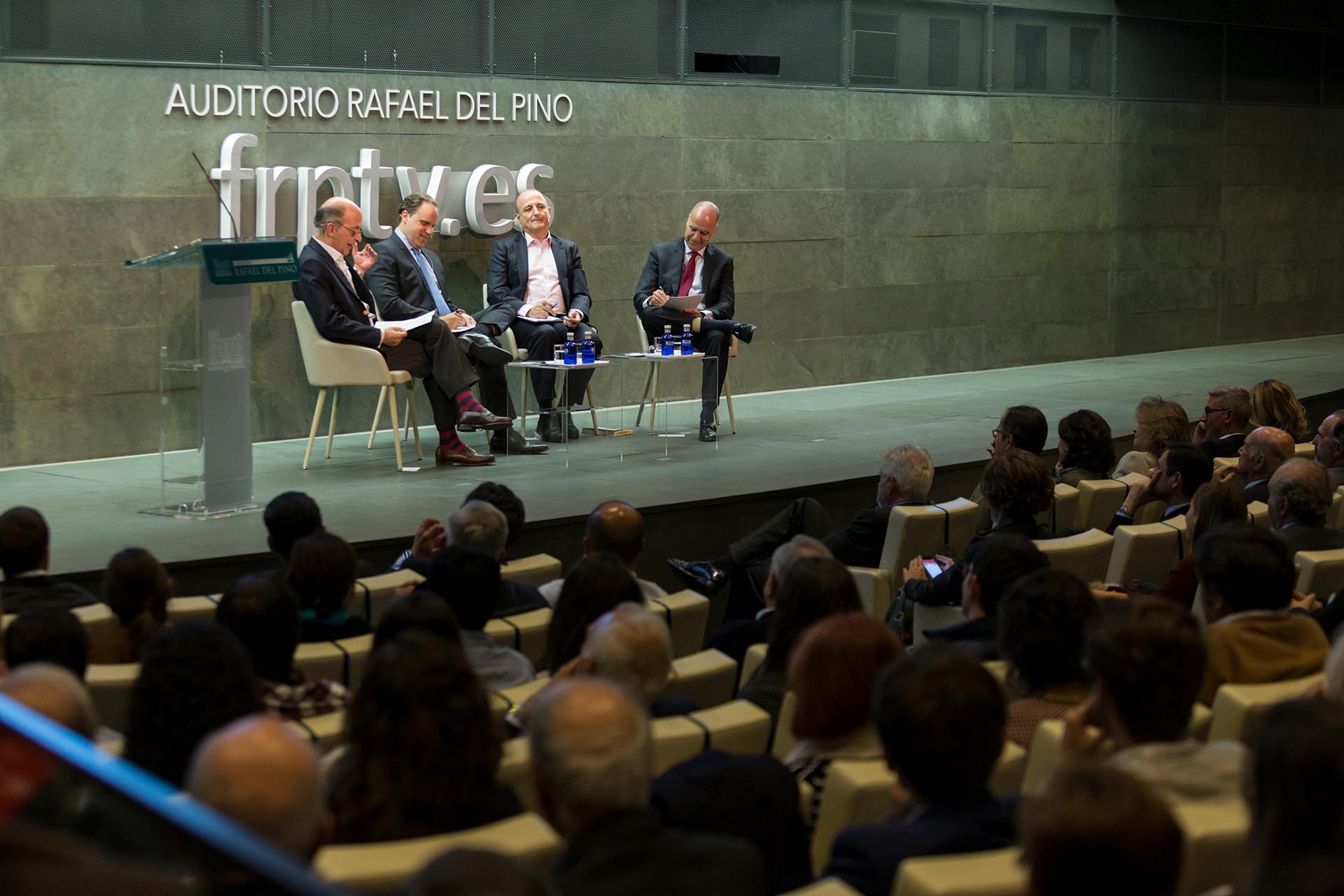Why central banks are paving the way for the next crisis
Summary:
On 14 November 2017, the presentation of the book "La gran trampa", by Daniel Lacalle, chief economist at Tressis, took place at the Rafael del Pino Foundation. In addition to the author, the event was also attended by Carlos Rodríguez Braun, Professor of History of Economic Thought at the Complutense University of Madrid; Miguel Sebastián, former Minister of Industry, Tourism and Trade and José Miguel Maté, CEO of Tressis SV. José Miguel Maté explained that the consequences of the current monetary policy go beyond the good intentions of central banks to stop the collapse of the financial system. Not only have the other objectives - economic growth, employment, resurgence of inflation - not been achieved, but collateral damage has been created in the form of increased inequality and loss of disposable income for the middle classes. Monetary policy measures, moreover, have generated asset inflation, leading to a lack of valuation of real risk, so that the bubble continues to grow. Governments have therefore refrained from structural reforms. What the central banks have done is try to buy time, but it will be difficult to get out of this situation because there will be crises in the financial markets that will affect economic growth. For Carlos Rodríguez Braun, asking central banks for help to solve the crisis is like asking Count Dracula for help to solve a security problem in Transylvania. He predicted that there will be a new crisis and that the markets, not the central banks, will be blamed for it. In this regard, he recalled that the United States created more money between 2008 and 2016 than in its entire previous history. Or that Argentina issued 100-year bonds, which had a demand three times higher than the supply, a fact that, given Argentina's history of defaults, is a clear sign that we are facing a bubble. Finally, he denounced the fact that the expansionary policies of central banks made it easier for governments not to carry out structural reforms. Miguel Sebastián, for his part, warned that central bankers are satisfied because, in the last twenty years, inflation has ceased to be a global problem, since both its level and its volatility have been reduced. However, dissatisfaction with central banks stems from the fact that they no longer seem to have been given enough of a mandate and have forgotten other things, such as asset inflation. For this reason, their objectives need to be reviewed. He also pointed out that money creation does not serve to promote long-term growth and that inflation is a monetary phenomenon and a tax. Technological advances and globalisation have led to disinflation in the world economy, if measured using consumer prices. But, simultaneously, there is an equity bubble in the United States and bond bubbles in Japan and the European Union, bubbles that have been fuelled by quantitative easing. That is why other objectives, such as asset inflation, must be incorporated into the mandate of central banks. Monetary policy, he added, should be counter-cyclical. However, what happened from 2000 to 2008 is that it has been pro-cyclical. In fact, the cause of the crisis was excessive private sector borrowing because central banks flooded the economy with liquidity from 2000, when the economy was booming. However, from 2008 onwards, an exceptional situation arose, which required exceptional measures such as quantitative easing, because there was a sharp drop in the circulation of money. Moreover, the European Central Bank acted late, which meant that it had to be more forceful than the Federal Reserve, and it did so when it saw that the euro could disappear. Finally, Daniel Lacalle recalled that, in crisis situations, expansionary policies have always been applied. In this sense, some defend monetary policy actions and others advocate their disappearance. But what nobody talks about is what is really important, that is, what can be done in the current scenario. What happened in the United States was that everything was entrusted to monetary policy and fiscal policy was forgotten. How could politicians tell citizens that austerity makes sense when someone can create all the money they want except for the citizens. That is why Trump won. The essential element is to consider solutions now given what is there. Otherwise, magical ideas become food for totalitarianism. In this sense, one might ask what kind of economics had been introduced for a half-point rise in interest rates, from 1% to 1.5%, to generate a crisis like the one we have experienced. What have we learned from the crisis? Nothing. Nothing. Many economists say that since zero rates don't work, we have to go to negative rates, with the idea that central planning fixes everything, but this is not the case. And the central banks, which have never seen a bubble coming, are now saying that they see no risk of one.
The Rafael del Pino Foundation is not responsible for the comments, opinions or statements made by the people who participate in its activities and which are expressed as a result of their inalienable right to freedom of expression and under their sole responsibility. The contents included in the summary of this conference are the result of the debates held at the meeting held for this purpose at the Foundation and are the responsibility of their authors.
The Rafael del Pino Foundation is not responsible for any comments, opinions or statements made by third parties. In this respect, the FRP is not obliged to monitor the views expressed by such third parties who participate in its activities and which are expressed as a result of their inalienable right to freedom of expression and under their own responsibility. The contents included in the summary of this conference are the result of the discussions that took place during the conference organised for this purpose at the Foundation and are the sole responsibility of its authors.







